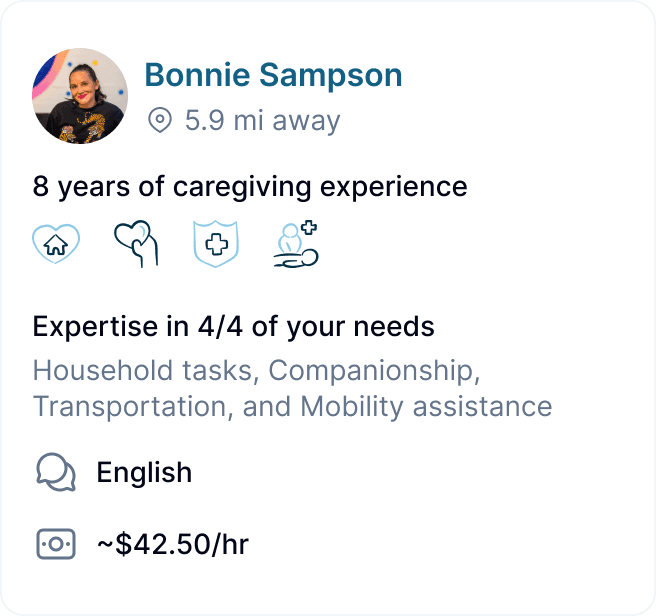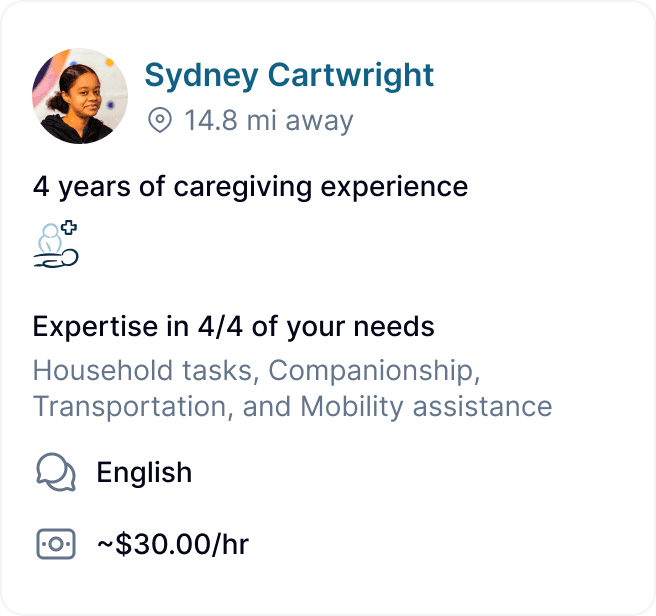Do Private Duty Caregivers Need Insurance?
Apr 7, 2025
Apr 7, 2025



Hiring a private duty caregiver can be a wonderful solution for families seeking personalized, flexible, and cost-effective home care for their loved ones. However, with this arrangement comes a set of responsibilities that many families may not initially consider—one of the most important being insurance.
Whether you’re hiring a caregiver directly or working with a facilitator like Clara, understanding the role of insurance is critical to protecting both your family and the caregiver.
What Is a Private Duty Caregiver?
A private duty caregiver is hired directly by families to provide non-medical assistance tailored to an individual’s needs. These caregivers help with tasks such as personal hygiene, meal preparation, medication reminders, companionship, and light housekeeping. Unlike agency caregivers, private duty caregivers are not employed by caregiving agencies, which means families have greater control over the hiring process and the type of care provided.
While this independence offers benefits like cost savings and personalized care, it also places administrative responsibilities on the family. This includes payroll management, taxes, and ensuring compliance with legal requirements—insurance being one of them.
Why Insurance Matters for Private Duty Caregivers
Insurance is essential for private duty caregivers for several reasons:
1. Financial Protection
Accidents can happen in any workplace, including the home. If a caregiver is injured while performing their duties—whether it’s lifting a client or slipping on a wet floor—medical expenses and lost wages can quickly add up. Workers’ compensation insurance covers these costs, sparing families from having to pay out of pocket.
For example, one real-life scenario involved a caregiver who sustained a back injury while working. Without workers’ compensation insurance, the family had to cover $15,000 in medical expenses and additional lost wages themselves.
2. Legal Protection
In states like California, household employers are required to carry workers’ compensation insurance if certain conditions are met: the caregiver has worked at least 52 hours in the past 90 days or earned at least $100 during that period. Failure to comply with these laws can result in significant fines, legal penalties, or even criminal charges. Beyond legal obligations, having insurance can prevent lawsuits related to workplace injuries.
You can read more about worker's compensation requirements in California for 2025 here.
3. Liability Coverage
Private caregivers often work closely with clients in intimate settings where accidents can occur. Liability insurance protects against claims arising from property damage or other incidents during caregiving activities. Without this coverage, families may find themselves financially vulnerable if disputes arise.
What Types of Insurance Are Needed?
When hiring a private duty caregiver directly, families should consider the following types of insurance:
Workers’ Compensation Insurance
This type of insurance is mandatory in many states under specific conditions and provides coverage for workplace injuries. It’s one of the most important protections for both caregivers and employers.
Liability Insurance
Liability insurance safeguards against claims related to damages or accidents that occur during caregiving services. For example, if a caregiver accidentally damages property while assisting with household tasks, liability coverage can help resolve the issue without financial strain.
How Can Families Obtain Insurance?
Families hiring private caregivers have several options for securing necessary insurance:
Homeowner’s Insurance Riders: Many homeowner’s policies offer workers’ compensation coverage as an add-on or “rider.” This can be an affordable way to meet legal requirements without purchasing a separate policy.
State Compensation Funds: In states like California, families can purchase workers’ compensation policies through state-run programs designed specifically for household employers.
Private Insurance Companies: Numerous private insurers offer policies tailored to household employers. These policies may include workers’ compensation and liability coverage.
Challenges Without Insurance
Choosing not to carry insurance for your private duty caregiver can lead to serious consequences:
Financial Risk: Without workers’ compensation insurance, families are responsible for covering medical expenses and lost wages if a caregiver is injured on the job.
Legal Penalties: Non-compliance with state laws regarding workers’ compensation can result in fines or criminal charges.
Potential Lawsuits: Caregivers may sue employers for workplace injuries if no insurance is in place.
By investing in proper insurance coverage, families protect themselves from these risks while fostering a safe and supportive environment for their caregiver.
Clara’s Role in Simplifying Private Duty Care
Hiring a private duty caregiver doesn’t have to be overwhelming. Clara helps families navigate the complexities of employing caregivers by facilitating essential administrative tasks such as payroll management and ensuring compliance with tax and insurance requirements. This allows families to focus on what truly matters: getting exceptional care for their loved ones.
If you’re considering hiring a private caregiver but feel unsure about how to handle legal obligations like insurance, Clara is here to guide you every step of the way. Schedule a call with a Clara Care Expert, or head to our Taxes and Legal page to learn more.
Hiring a private duty caregiver can be a wonderful solution for families seeking personalized, flexible, and cost-effective home care for their loved ones. However, with this arrangement comes a set of responsibilities that many families may not initially consider—one of the most important being insurance.
Whether you’re hiring a caregiver directly or working with a facilitator like Clara, understanding the role of insurance is critical to protecting both your family and the caregiver.
What Is a Private Duty Caregiver?
A private duty caregiver is hired directly by families to provide non-medical assistance tailored to an individual’s needs. These caregivers help with tasks such as personal hygiene, meal preparation, medication reminders, companionship, and light housekeeping. Unlike agency caregivers, private duty caregivers are not employed by caregiving agencies, which means families have greater control over the hiring process and the type of care provided.
While this independence offers benefits like cost savings and personalized care, it also places administrative responsibilities on the family. This includes payroll management, taxes, and ensuring compliance with legal requirements—insurance being one of them.
Why Insurance Matters for Private Duty Caregivers
Insurance is essential for private duty caregivers for several reasons:
1. Financial Protection
Accidents can happen in any workplace, including the home. If a caregiver is injured while performing their duties—whether it’s lifting a client or slipping on a wet floor—medical expenses and lost wages can quickly add up. Workers’ compensation insurance covers these costs, sparing families from having to pay out of pocket.
For example, one real-life scenario involved a caregiver who sustained a back injury while working. Without workers’ compensation insurance, the family had to cover $15,000 in medical expenses and additional lost wages themselves.
2. Legal Protection
In states like California, household employers are required to carry workers’ compensation insurance if certain conditions are met: the caregiver has worked at least 52 hours in the past 90 days or earned at least $100 during that period. Failure to comply with these laws can result in significant fines, legal penalties, or even criminal charges. Beyond legal obligations, having insurance can prevent lawsuits related to workplace injuries.
You can read more about worker's compensation requirements in California for 2025 here.
3. Liability Coverage
Private caregivers often work closely with clients in intimate settings where accidents can occur. Liability insurance protects against claims arising from property damage or other incidents during caregiving activities. Without this coverage, families may find themselves financially vulnerable if disputes arise.
What Types of Insurance Are Needed?
When hiring a private duty caregiver directly, families should consider the following types of insurance:
Workers’ Compensation Insurance
This type of insurance is mandatory in many states under specific conditions and provides coverage for workplace injuries. It’s one of the most important protections for both caregivers and employers.
Liability Insurance
Liability insurance safeguards against claims related to damages or accidents that occur during caregiving services. For example, if a caregiver accidentally damages property while assisting with household tasks, liability coverage can help resolve the issue without financial strain.
How Can Families Obtain Insurance?
Families hiring private caregivers have several options for securing necessary insurance:
Homeowner’s Insurance Riders: Many homeowner’s policies offer workers’ compensation coverage as an add-on or “rider.” This can be an affordable way to meet legal requirements without purchasing a separate policy.
State Compensation Funds: In states like California, families can purchase workers’ compensation policies through state-run programs designed specifically for household employers.
Private Insurance Companies: Numerous private insurers offer policies tailored to household employers. These policies may include workers’ compensation and liability coverage.
Challenges Without Insurance
Choosing not to carry insurance for your private duty caregiver can lead to serious consequences:
Financial Risk: Without workers’ compensation insurance, families are responsible for covering medical expenses and lost wages if a caregiver is injured on the job.
Legal Penalties: Non-compliance with state laws regarding workers’ compensation can result in fines or criminal charges.
Potential Lawsuits: Caregivers may sue employers for workplace injuries if no insurance is in place.
By investing in proper insurance coverage, families protect themselves from these risks while fostering a safe and supportive environment for their caregiver.
Clara’s Role in Simplifying Private Duty Care
Hiring a private duty caregiver doesn’t have to be overwhelming. Clara helps families navigate the complexities of employing caregivers by facilitating essential administrative tasks such as payroll management and ensuring compliance with tax and insurance requirements. This allows families to focus on what truly matters: getting exceptional care for their loved ones.
If you’re considering hiring a private caregiver but feel unsure about how to handle legal obligations like insurance, Clara is here to guide you every step of the way. Schedule a call with a Clara Care Expert, or head to our Taxes and Legal page to learn more.
Hiring a private duty caregiver can be a wonderful solution for families seeking personalized, flexible, and cost-effective home care for their loved ones. However, with this arrangement comes a set of responsibilities that many families may not initially consider—one of the most important being insurance.
Whether you’re hiring a caregiver directly or working with a facilitator like Clara, understanding the role of insurance is critical to protecting both your family and the caregiver.
What Is a Private Duty Caregiver?
A private duty caregiver is hired directly by families to provide non-medical assistance tailored to an individual’s needs. These caregivers help with tasks such as personal hygiene, meal preparation, medication reminders, companionship, and light housekeeping. Unlike agency caregivers, private duty caregivers are not employed by caregiving agencies, which means families have greater control over the hiring process and the type of care provided.
While this independence offers benefits like cost savings and personalized care, it also places administrative responsibilities on the family. This includes payroll management, taxes, and ensuring compliance with legal requirements—insurance being one of them.
Why Insurance Matters for Private Duty Caregivers
Insurance is essential for private duty caregivers for several reasons:
1. Financial Protection
Accidents can happen in any workplace, including the home. If a caregiver is injured while performing their duties—whether it’s lifting a client or slipping on a wet floor—medical expenses and lost wages can quickly add up. Workers’ compensation insurance covers these costs, sparing families from having to pay out of pocket.
For example, one real-life scenario involved a caregiver who sustained a back injury while working. Without workers’ compensation insurance, the family had to cover $15,000 in medical expenses and additional lost wages themselves.
2. Legal Protection
In states like California, household employers are required to carry workers’ compensation insurance if certain conditions are met: the caregiver has worked at least 52 hours in the past 90 days or earned at least $100 during that period. Failure to comply with these laws can result in significant fines, legal penalties, or even criminal charges. Beyond legal obligations, having insurance can prevent lawsuits related to workplace injuries.
You can read more about worker's compensation requirements in California for 2025 here.
3. Liability Coverage
Private caregivers often work closely with clients in intimate settings where accidents can occur. Liability insurance protects against claims arising from property damage or other incidents during caregiving activities. Without this coverage, families may find themselves financially vulnerable if disputes arise.
What Types of Insurance Are Needed?
When hiring a private duty caregiver directly, families should consider the following types of insurance:
Workers’ Compensation Insurance
This type of insurance is mandatory in many states under specific conditions and provides coverage for workplace injuries. It’s one of the most important protections for both caregivers and employers.
Liability Insurance
Liability insurance safeguards against claims related to damages or accidents that occur during caregiving services. For example, if a caregiver accidentally damages property while assisting with household tasks, liability coverage can help resolve the issue without financial strain.
How Can Families Obtain Insurance?
Families hiring private caregivers have several options for securing necessary insurance:
Homeowner’s Insurance Riders: Many homeowner’s policies offer workers’ compensation coverage as an add-on or “rider.” This can be an affordable way to meet legal requirements without purchasing a separate policy.
State Compensation Funds: In states like California, families can purchase workers’ compensation policies through state-run programs designed specifically for household employers.
Private Insurance Companies: Numerous private insurers offer policies tailored to household employers. These policies may include workers’ compensation and liability coverage.
Challenges Without Insurance
Choosing not to carry insurance for your private duty caregiver can lead to serious consequences:
Financial Risk: Without workers’ compensation insurance, families are responsible for covering medical expenses and lost wages if a caregiver is injured on the job.
Legal Penalties: Non-compliance with state laws regarding workers’ compensation can result in fines or criminal charges.
Potential Lawsuits: Caregivers may sue employers for workplace injuries if no insurance is in place.
By investing in proper insurance coverage, families protect themselves from these risks while fostering a safe and supportive environment for their caregiver.
Clara’s Role in Simplifying Private Duty Care
Hiring a private duty caregiver doesn’t have to be overwhelming. Clara helps families navigate the complexities of employing caregivers by facilitating essential administrative tasks such as payroll management and ensuring compliance with tax and insurance requirements. This allows families to focus on what truly matters: getting exceptional care for their loved ones.
If you’re considering hiring a private caregiver but feel unsure about how to handle legal obligations like insurance, Clara is here to guide you every step of the way. Schedule a call with a Clara Care Expert, or head to our Taxes and Legal page to learn more.
More about taxes and legal
More about taxes and legal
GEt started for free
Better care starts with Clara.
Find, hire, and pay top-notch caregivers without the headache for a price that fits your budget.



GEt started for free
Better care starts with Clara.
Find, hire, and pay top-notch caregivers without the headache for a price that fits your budget.



GEt started for free
Better care starts with Clara.
Find, hire, and pay top-notch caregivers without the headache for a price that fits your budget.








